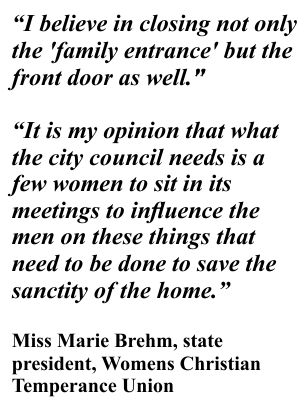|
Augusta was the daughter of George and Caroline
Letterman; Frank's parents and siblings had settled
in Buffalo, NY. Augusta and Frank married in 1883
and relocated to Chicago by at least 1887. Frank
first worked at a meat market but by 1888 worked as
a bartender. His saloon in 1903 was located at 233
Vanburen in Chicago. A daughter, Clara, was born in
1884, Jacob two years later.
Augusta's body was discovered at the Cook County
morgue and Jacob's at Rolston's Funeral Home. Frank
C. Kochems identified his son's body, and Mark O.
Jucknies, a printing press operator of unknown
relationship to the Kochems, identified Augusta's.
Jucknies also lived in the 11th ward so may have
been a neighbor or a patron at Frank's bar.†
The Kochems funeral was held on Sunday afternoon
after the fire, but the coffins were stored in a
vault, and interment at Forest Home Cemetery in
Chicago wasn't for six months, perhaps waiting until
Frank could afford it. His grief was shared with his
daughter, Clare Kochems Altman, who lived in Chicago
with her husband of six months, Harrie P. Altman.

|

|
|
In the news in the weeks before, the fire saloon keeper, Frank Kochems, was
probably reading newspaper reports of an ordinance proposed by the Women's
Christian Temperance Union (W.C.T.U.). Aimed at protecting women from the evil
effects of alcohol, the ordinance sought to discourage patrons, specifically
women, and families, from frequenting back rooms, also called wine rooms, in
saloons, by forcing the elimination of side entrances. The idea was that if
forced to incur the shame of walking into a saloon through the front entrance,
women and families would stay out of saloons altogether.
"To nail up the side door of the dram shop will mean the saving of thousands of
girls who each year go to their ruin through its portals," said another W.C.T.U.
officer. The 1903 campaign was the second waged against side doors by the group.
Chicago police
chief O'Neall had a different idea of the problem, as well as the solution.
A week before the Iroquois Theater fire, the city council referred a proposed
ordinance to the judiciary committee for consideration. It would have prohibited
even a window in the back of a saloon and dictated that liquor could be sold in
only one room. It was killed five months later as being too drastic. Instead, a
prohibition of Family Entrance signage on the side door was under
consideration.
|
In the years after the fire
Frank had a $20,000 Aetna life insurance policy on
Jacob but none on Augusta. Frank remarried two years
after the Iroquois Theater fire to a woman named Ida
R. Van Sciver Smith. They purchased a home on Warren
Avenue in Chicago and had several lodgers, but in
1930 Frank was once again a widow. In the 1940 U.S.
Census, he described himself as a restaurant owner.
|
|
Discrepancies and addendum
* In some victim lists and official records, the name
was spelled Kerems, Ketchem, Kochems, or Kochenis.
† A Davenport, Iowa newspaper, however, reported
that Augusta's son-in-law, Harrie P. Altman, a
Chicago resident, identified the bodies. Harrie's
father, James S. Altman, was a judge in Davenport
and may have been made assumptions based on
telegrams. Another source reported that both were
identified by Frank. Possibly Jucknies and Altman
joined Frank in the search.
|
